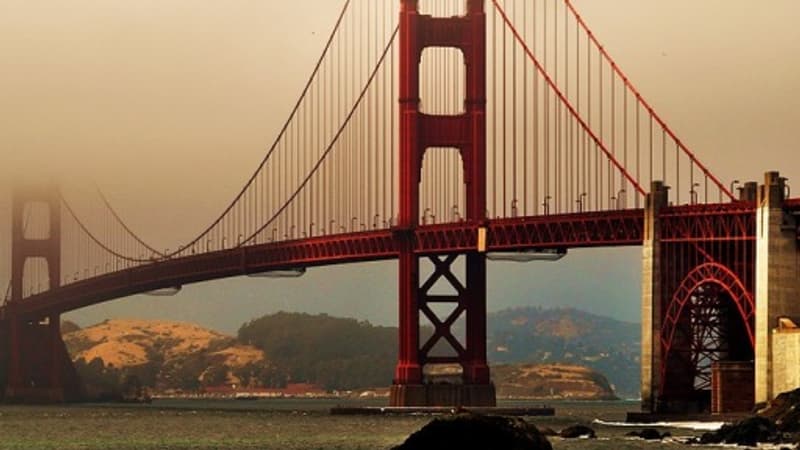“Here when you walk into a cafe, you can meet our future collaborator.” Tinted with a touch of irony, Nicolas Dessaigne nevertheless claims to be not far from reality. Here is San Francisco. The place for all technological entrepreneurs who want to set up or develop their business. Often disappointed with Paris, wanting to dream big, they want to take on the giants of the sector.
Nicolas Dessaigne arrived in San Francisco in 2015. Tall, thin, with gray hair, he has a sense of timing and says he will arrive in “7 minutes.” He made an appointment with Tech & Co at the Y Combinator facilities, one of the world’s largest technology incubators, located in the heart of San Francisco on a street that brings together the main luxury brands. Tables, chairs, brick walls, equipped kitchen, the fully glazed space is designed to better accommodate new entrepreneurs.
“It’s the first time I’ve come here,” he admits. Since the pandemic, Y Combinator has been juggling between virtual and in-person support. Airbnb or Dropbox are examples of the approximately 3,000 companies that have benefited from Y Combinator, from the idea of the concept to its IPO. Some French companies are part of the incubated startups.
Among them, Algolia, the company founded by Nicolas Dessaigne. When a consumer searches for a product on the Lacoste, LVMH or ManoMano sites, Algolia processes the results page that is displayed. “Today there are 17,000 customers worldwide and between 5 and 6 billion requests per day.”
“Tech League 1”
In the winter of 2014, Paris-founded Algolia launched alongside Y Combinator. Bingo, the company is accompanied a few months later. The departure for San Francisco is organized, and in 2015 Nicolas Dessaigne arrives. “Coming here was the opportunity to address a global market and not just European or French,” he explains.
The company decided to settle in San Francisco because “it is the number one destination for all entrepreneurs, talent is much more accessible. San Francisco is not League 1 of technology”, he amuses himself by comparing the contractor. Although he admits that San Francisco is not an obligatory step, he maintains that the city is a great help and he is enthusiastic: “here we see bigger, we are immediately at the bottom, but that is why everything is harder”.
While Y Combinator helped him grow his business, now he wants to help the next generation. He left his directorship at Algolia, though he still keeps an eye on the company, which maintains offices in Paris. Nicolas Dessaigne is now a consultant at Y Combinator. “YC helped me a lot, I was able to immediately benefit from their network even before that of the French community present here, now I want to communicate in turn”.
When he compares his American experience with that of Paris, he argues that his business would not have grown as quickly if he had stayed in France. However, “the contrast between Paris and San Francisco is less strong than it was ten years ago. He observes, for example, that fundraising in Paris is much easier today and that the entrepreneurs are better trained.
He says he is fascinated by the “spirit of serendipity” present in the Californian city.
And for good reason, many French businessmen have chosen San Francisco and the French community numbers almost 60,000 people. “We have almost 3,000 people on our list,” says Sophie Rougerie, coordinator at French Tech San Francisco.
Well established French technology
Arriving in the Bay Area just over ten years ago with her family, Sophie Rougerie has been coordinating French Tech San Francisco for just over a year. Her role is to connect French entrepreneurs, organize events so everyone can network, “create a dynamic and synergy,” she adds.
Launched in 2016, the San Francisco branch is experiencing “a good time and has established itself quickly. Given the number of French people here, there is a real need for structures like this,” observes the entrepreneur. “The sky is the limit” is a bit of Sophie’s mantra to describe the American spirit. “Here the only limit is your energy”, she continues, “in San Francisco everything goes faster”, which she herself was able to verify with her business.
She came as much for personal reasons, “we wanted our three children to speak English and acquire real adaptability”, and for professional reasons. When he arrived, his company developed baby travel beds called Magicbed. “Fundraising here is easier and faster, the ceilings are higher, and the support is simpler.”
As a French expat, she was “pleasantly surprised” by how easy it is to fit in. “People come to us easily, the associations or the French community have been a great help.”
He has also worked in public relations and communication, which allowed him to meet French businessmen and Silicon Valley gamers. “I ended up being offered this position as coordinator of French Tech San Francisco.”
However, setting up a company in the United States is much more risky: “there is no safety net, no social system, and no unemployment benefits. If your business does not work, if you are a tenant, you lose your home”. After the Covid, the United States launched a system of aid for companies. “In Silicon Valley, you are the one who builds your stability”, slices the coordinator
To the question “Is the United States stealing talent from France?”, he answers that he sees it more as “a balance. French Tech is also there to show its entrepreneurs, the French come and go, often not staying in San Francisco indefinitely”. For her part, she immediately applied for the green card and, for the moment, does not have a return date to France.
Beyond the American border, French Tech is doing quite well, having in 2022 experienced record fundraising of €14 billion.
Source: BFM TV


